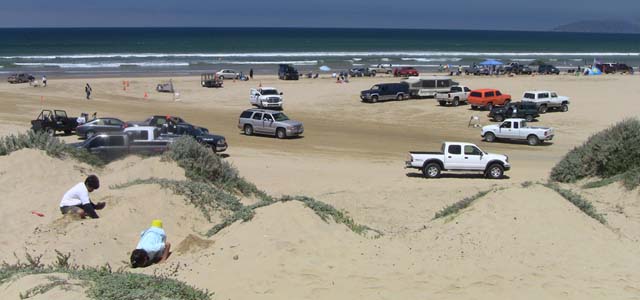Appellate court rejects APCD rehearing request
April 23, 2015
 By KAREN VELIE
By KAREN VELIE
After spending less than two days reviewing the San Luis Obispo County Air Pollution Control District’s request for a rehearing on the Oceano Dunes dust rule lawsuit, on Thursday, the 2nd Appellate Court in Ventura denied the district’s request.
In its denial for a rehearing, the court modified its April 6 ruling by fixing three grammatical errors. The appellate court did not change its opinion that the APCD does not have the power to regulate air emissions at state parks through the permit process.
APCD Executive Director Larry Allen said he had no comment on Thursday’s appellate court modification and denial for a rehearing.
The dust rule requires the California Department of Parks and Recreation to reduce the particulate matter blowing from the Oceano Dunes State Vehicular Recreation Area or face fines of $1,000 per day. The rule is based on a study that concludes off-road vehicle activity on the dunes has caused an increase in particulate matter blowing to the Nipomo Mesa.
Opponents of the rule said it was based on inaccurate science and pushed as a financial means to pay APCD salaries.

In 2012, Friends of Oceano Dunes filed a suit against the APCD saying it used flawed scientific practices in its report and that it failed to prove that off-road vehicle activity has caused an increase in pollution on the Nipomo Mesa.
In 2013, San Luis Obispo County Superior Court Judge Charles Crandall ruled against Friends of Oceano Dunes saying that “a managed recreational facility is reasonably viewed as ‘a contrivance,’ a manmade device.
The appellate court overturned Crandall’s ruling on the meaning of the word contrivance.
“Neither the trial court nor an appellate court is at liberty to pick a dictionary definition to reach a desired result,” the appellate court ruling says. “Thus, the trial court erroneously ruled that a local air pollution control district has the power to regulate air emissions emanating from a state park by a permit requirement.”
Shortly after the ruling, Allen and APCD attorney Ray Biering proposed making an appeal to the Supreme Court, a request that appeared not to have the support of the entire board. Allen called for a special APCD Board meeting for April 16 and then sent a letter the federal Environmental Protection Agency that said the APCD’s efforts to control pollution on the Nipomo Mesa had been impacted by the appellate court’s ruling.
On April 15, the EPA responded to Allen in a letter that said the appellate courts ruling could impact the ability of the APCD to enforce the dust rule and protect public health.
“This development raises concerns regarding the future viability of the District’s strategy of relying on Rule 1001 to address PM2.S and PM10 NAAQS exceedances,” the EPA letter says. “If legal or other developments close off this approach, EPA and the District will need to re-visit other options for addressing NAAQS exceedances, including the possibility of federal action to designate the area to non-attainment.…”
On April 16, the APCD Board voted 9-3 to have the district seek a rehearing. In its request for a rehearing, the APCD said the court’s decision was inconsistent with the law.
“As such, respondent district respectfully contends that the decision warrants further review, rehearing, and clarification on the grounds of omission or misstatement of material issues or facts, mistakes of law, and imperfect and impractical directions to the Superior Court,” the APCD said in its request for a rehearing.
While the district lost its primary request for a rehearing, it was able to get the court to agree to change its wording about “regulating the operation” to “requiring a permit.” Nevertheless, the changes would likely make the appellate court’s opinion more bullet proof.
The district has until June 3 to file a Supreme Court appeal.
Don’t miss links to breaking news stories, like CCN on Facebook.






The comments below represent the opinion of the writer and do not represent the views or policies of CalCoastNews.com. Please address the Policies, events and arguments, not the person. Constructive debate is good; mockery, taunting, and name calling is not. Comment Guidelines